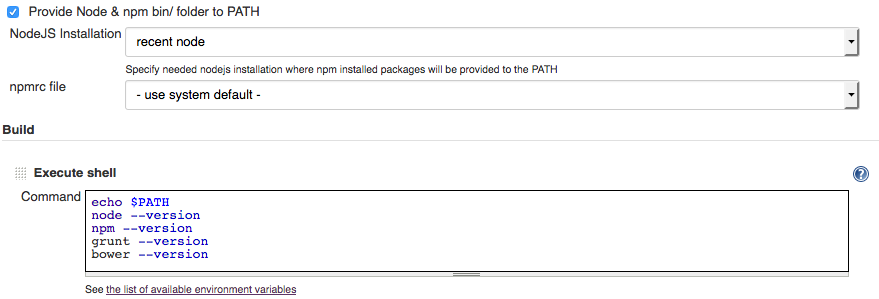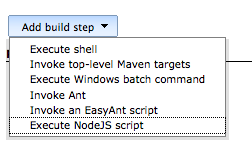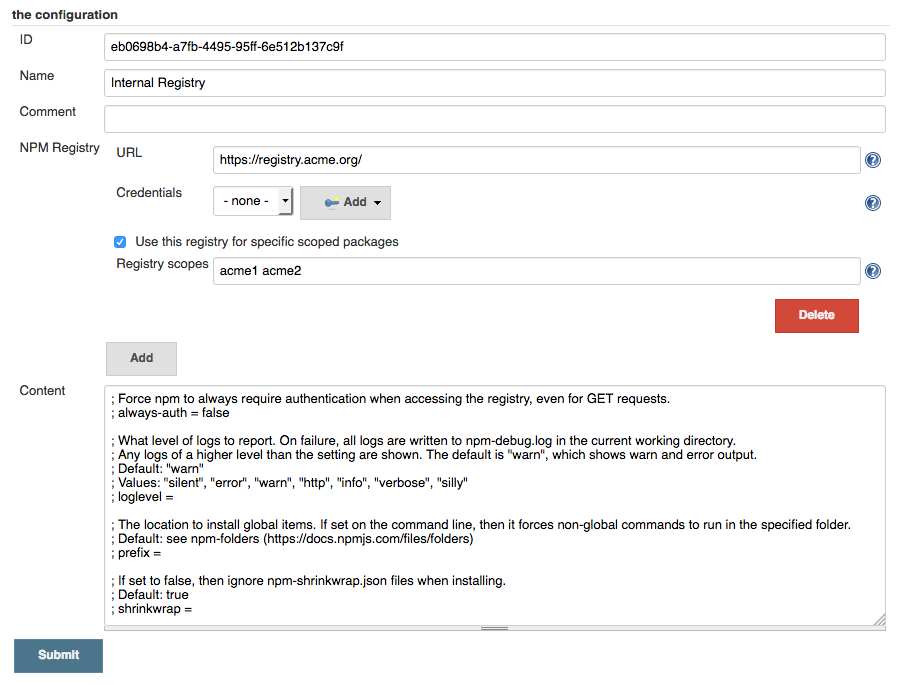Plugin Information |
|---|
View NodeJS on the plugin site for more information. |
Download & Installation
You can download the latest .hpi and install it from the Manage Plugins menu, or install this plugin directly from the Plugins Update Center.
Main features
- Provides NodeJS auto-installer, allowing to create as many NodeJS installations "profiles" as you want.
The auto-installer will automatically install a given version of NodeJS, on every jenkins slave where it will be needed - Allows to install globally some npm packages inside each installations, these npm packages will be made available to the PATH
- Allows to execute some NodeJS script, under a given NodeJS installation
- Allows use custom NPM user configuration file defined with config-file-provider plugin to setup custom NPM settings
- Add a lightweight support to DSL pipeline
- Force 32bit architecture
- Relocate npm cache folder using pre defined streategies
Usage
- After installing the plugin, go to the global jenkins configuration panel (JENKINS_URL/configure or JENKINS_URL/configureTools if using jenkins 2),
and add new NodeJS installations. For every Nodejs installation, you can choose to install some global npm packages.
Note that you might provide npm package's version (with syntax "package@0.1.2" for instance, or maybe better, "package@~0.1.0") in order to enforce
Since 1.2.6 you could force the installation of the 32bit package for the underlying architecture if supported. If the package is not available the build will fail.
reproductibility of your npm execution environnment (the ~ syntax allows to benefits from bugfixes without taking the risk of a major version upgrade)
See below:- Now, go to a job configuration screen, you will have 2 new items :
- On the "Build environnment" section, you will be able to pick one of the NodeJS installations to provide its bin/ folder to the PATH.
This way, during shell build scripts, you will have some npm executables available to the command line (like bower or grunt)
See below: - On the "Build" section, you will be able to add a "Execute NodeJS script" build step
This way, you will be able to fill a textarea with the script content you want to execute.
Note that you will have to select a NodeJS runtime you previously installed, to specify the NodeJS version you want to use
during your NodeJS script execution.
- On the "Build environnment" section, you will be able to pick one of the NodeJS installations to provide its bin/ folder to the PATH.
- You can customise any NPM settings you need creating a NPM config file where you can also setup multiple npm registry (scoped or public)
and select for each one stored credential (only user/password supported type) as follow:
and than select the config file to use for each configured build step - You would relocate the npm cache folder to swipe out it when a job is removed or workspace folder is deleted. There are three default strategy:
- per node, that is the default NPM behavour. All download package are placed in the ~/.npm on Unix system or %APP_DATA%\npm-cache on Windows system;
- per executor, where each executor has an own NPM cache folder placed in ~/npm-cache/$executorNumber;
- per job, placed in the workspace folder under $WORKSPACE/npm-cache. This cache will be swipe out together the workspace and will be removed when the job is deleted.
Pipeline
The current supported DSL steps are:
- nodejs (as buildwrapper)
- tools
In a Declarative pipeline you can add any configured NodeJS tool to your job, and it will enhance
the PATH variable with the selected NodeJS installation folder, instead in scripted pipeline you have to do it manually.
node {
env.NODEJS_HOME = "${tool 'Node 6.x'}"
// on linux / mac
env.PATH="${env.NODEJS_HOME}/bin:${env.PATH}"
// on windows
env.PATH="${env.NODEJS_HOME};${env.PATH}"
sh 'npm --version'
}
This example show the use of buildwrapper, where enhanced PATH will be available only inside the brace block
pipeline {
agent any
stages {
stage('Build') {
steps {
nodejs(nodeJSInstallationName: 'Node 6.x', configId: '<config-file-provider-id>') {
sh 'npm config ls'
}
}
}
}
}
Known limitations / issues
NodeJS version 1.0 has adapted its code to the most recent Jenkins API (1.6xx). If also EnvInject is installed you will fall in JENKINS-26583
that corrupts setup of the nodejs installation bin folder into PATH environment. In this case consider if update or not or use an own build from
this branch untill the JENKINS-26583 will not be fixed.
- If you update from NodeJS 0.2.2 or earlier to newer version materializes a data migration. This data migration is transparent to the users but
you can not back to 0.2.2 without lost global configuration tools and job build step configuration. - NodeJS versions prior to 0.9.0 won't be available at the moment (directory structure was not the same as today on distribution site).
This might be handled in the future (this is exposed as PathResolver implementation) :
don't hesitate to provide new implementations for previous versions and submit a PR on github. - Supported architecture are:
- Windows 32/64 bit
- Linux 32/64 bit
- OSX (intel) 64 bit
- Arm 6l/7l/64
- SunOS
Releases Notes
Moved to github repository page





